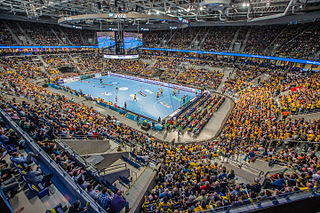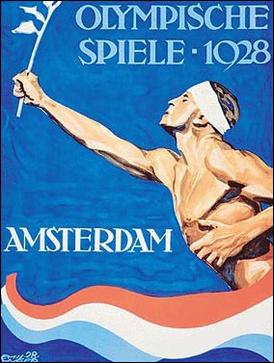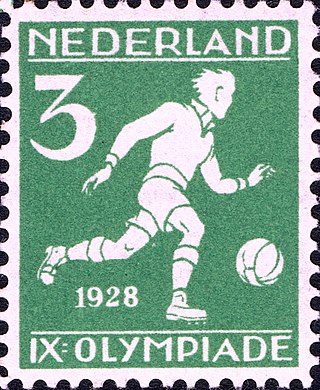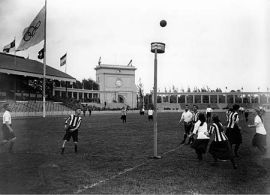
Handball is a team sport in which two teams of seven players each pass a ball using their hands with the aim of throwing it into the goal of the opposing team. A standard match consists of two periods of 30 minutes, and the team that scores more goals wins.

Korfball is a ball sport, with similarities to netball and basketball. It is played by two teams of eight players with four female players and four male players in each team. The objective is to throw a ball into a netless basket that is mounted on a 3.5 m high pole.

The 1928 Summer Olympics, officially the Games of the IX Olympiad, was an international multi-sport event that was celebrated from 28 July to 12 August 1928 in Amsterdam, Netherlands. The city of Amsterdam had previously bid for the 1920 and 1924 Olympic Games. Still, it was obliged to give way to war-torn Antwerp in Belgium for the 1920 Games and Pierre de Coubertin's Paris for the 1924 Games.

Olympic sports are sports that are contested in the Summer Olympic Games and Winter Olympic Games. The 2024 Summer Olympics included 32 sports; the 2022 Winter Olympics included seven sports. Each Olympic sport is represented at the International Olympic Committee (IOC) by an international governing body called an International Federation (IF).

A team sport is a type of sport where the fundamental nature of the game or sport requires the participation of multiple individuals working together as a team, and it is inherently impossible or highly impractical to execute the sport as a single-player endeavour. In team sports, the cooperative effort of team members is essential for the sport to function and achieve its objectives. The objective often involves teammates facilitating the movement of a ball or similar bob in accordance with a set of rules in order to score points. Examples are basketball, volleyball, rugby, water polo, handball, lacrosse, cricket, baseball, and the various forms of football and hockey. These sports emphasize teamwork, strategy, and coordination among team members while competing against opposing teams to achieve a common goal. Team sports do not include individual or individual-to-team events within a sport.

The Olympic Stadium is a sporting venue which was used as the main stadium for the 1928 Summer Olympics in Amsterdam. The venue is currently used mostly for athletics, other sports events and music concerts.

Chile competed at the 1928 Summer Olympics in Amsterdam, Netherlands, the nation's fifth appearance out of eight editions of the Summer Olympic Games. The all-male national team of 38 athletes competed in 22 events in 6 sports. This edition marked Chile's first Olympic medal in the silver category.

Argentina competed at the 1928 Summer Olympics in Amsterdam, Netherlands, the nation's fifth appearance out of eight editions of the Summer Olympic Games. Argentina sent its second national team, under the auspices of the Argentine Olympic Committee, 81 athletes that competed in 41 events in 12 sports. Argentina competed in equestrian, football, sailing, water polo, and wrestling for the first time. Argentina won 3 gold medals, its first Olympic championships in boxing and swimming. The team also won its first medals in fencing and football.

Egypt competed at the 1928 Summer Olympics in Amsterdam, Netherlands. 32 competitors, all men, took part in 15 events in 5 sports.

France competed at the 1928 Summer Olympics in Amsterdam, Netherlands. 255 competitors, 219 men and 36 women, took part in 112 events in 17 sports. At the beginning of the games there was an incident where a French coach was physically assaulted by a Stadium gatekeeper who refused him entry. It boiled over to a point where the entire French team did not participate in the Parade of Nations, and conversations were made to pull out of the games completely. However, the issue was resolved and France went on to compete.

Lacrosse has been contested at two editions of the Summer Olympic Games, 1904 and 1908. Both times a Canadian team won the competition. In its first year, two teams from Canada and one team from the United States competed at the games in St. Louis, Missouri. Only two teams, one from Canada and one from Great Britain competed in 1908 in London.

Football was one of the tournaments at the 1928 Summer Olympics. It was won by Uruguay against Argentina, and was the last Olympic football tournament before the inception of the FIFA World Cup, which was held for the first time in 1930. This edition, along with the preceding 1924 edition, were the only tournaments in history outside of the World Cup that count as Senior World Titles equivalent to the World Cup.

The Netherlands competed at the 1920 Summer Olympics in Antwerp, Belgium. 130 competitors, 129 men and 1 woman, took part in 58 events in 15 sports.

The Netherlands was the host nation for the 1928 Summer Olympics in Amsterdam. 266 competitors, 222 men and 44 women, took part in 103 events in 17 sports.

Belgium competed at the 1928 Summer Olympics in Amsterdam, Netherlands. 187 competitors, 176 men and 11 women, took part in 90 events in 15 sports.

Lacrosse was a demonstration sport at the 1928 Summer Olympics in Amsterdam. Teams from Canada, Great Britain, and the United States played round-robin matches on August 5, 6 and 7. Each team ended the tournament with a record of 1 win and 1 loss.

Korfball was a demonstration sport at the 1920 Olympic Games in Antwerp. It took place at the Olympisch Stadion at 22 August 1920. It was the first appearance of korfball at the Olympic Games, and was contested by a team from South Holland and a team from Amsterdam.

Nicolaas Broekhuijsen, better known as Nico Broekhuysen, was a Dutch teacher, who is known as the inventor of korfball.
The Protocol of Stockholm was an agreement between the International Amateur Handball Federation (IAHF) and Fédération Internationale de Basketball, made in 1934 to transfer the oversight of basketball from the IAHF to the FIBB.



















